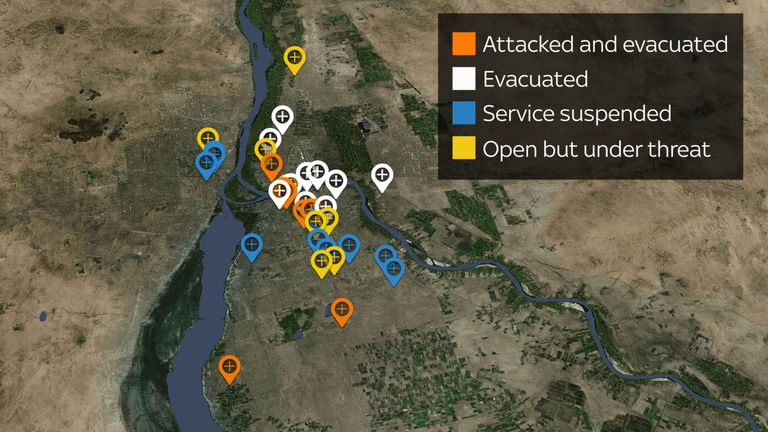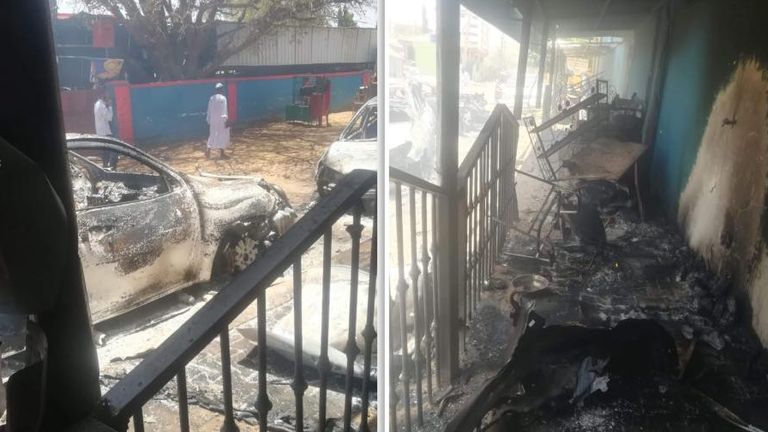Intense violence continues to rock Sudan a week after fighting first erupted between its army and the Rapid Support Forces (RSF) paramilitary force.
More than 400 people have been killed and at least 3,500 injured in the violence, according to the United Nations.
The capital city Khartoum remains at the epicentre of the conflict, with many of its residents still stuck in their homes without access to water or electricity amid air strikes, gunfire and shelling.
Ceasefire attempt fails
Clashes have been reported across the city, dashing hopes of a 72-hour ceasefire that the RSF had said it would adhere to in honour of the Muslim holiday, Eid al Fitr.
Residents reported hearing shootouts between paramilitaries and army forces on Friday morning after it emerged the military had deployed troops on foot in the capital for the first time in the week-long fight.
A video posted on the Sudan Armed Forces’ Facebook page shows armed soldiers advancing down a road in the capital to a cheering crowd.
Another clip filmed in the residential district of Bahri, North Khartoum, captures the sound of rapid gunfire just before 6am on Friday, which was when the ceasefire was supposed to begin.
Heavy fighting was reported in Khartoum on Friday afternoon. Another video, captured around 10 miles closer to the centre of Khartoum shows black smoke billowing from a building in the north of the city while a convoy of vehicles move down the road. It’s not clear whether these are the Sudanese army or RSF.
Attempts to seize infrastructure
Both videos were filmed in areas adjacent to Khartoum International Airport, which has been one of the city’s major battlegrounds.
The warring sides are attempting to seize key infrastructure sites and the airport is one of Khartoum’s most significant – for strategic and symbolic reasons. It’s been the subject of conflicting reports from the two parties, both of whom claimed as recently as Thursday to have a presence there.
Satellite images captured of the airport show how at least 13 aeroplanes, including a military transport plane, have been destroyed in the days since the fighting began.
Slide the marker below to see how the airport looked on Wednesday compared to in November last year.
Hospitals severely impacted
Sudan’s medical facilities have also been seriously affected by the violence. The Sudan Doctor’s Union has said 70% of hospitals in areas around the fighting across Sudan are now out of use.
Some have been damaged or destroyed in shelling, others have had to evacuate all patients due to fighting while others are suffering severe shortages in staff, medicine, food and power.
The map below shows just some of those affected in Khartoum.
The group described how three hospitals in the city of El Obeid in Darfur had been severely damaged by the fighting and urged international organisations to establish humanitarian corridors as soon as possible.
How did it begin?
The conflict began in earnest on 15 April, but the power struggle between General Abdel Fattah al Burhan, who leads the armed forces, and RSF leader General Mohamed Hamdan Dagalo (known as Hemedti) have been brewing for some time.
Both men had worked together to topple former leader Omar al Bashir in 2019 but are now at odds about how they think the country should be run. Al Burhan has since become Sudan’s de-facto head of state following a military coup in 2021 and has promised to oversee the country’s transfer to civilian rule.
At the core of this dispute is a disagreement over one of tenets of the agreed framework for how that transition will be made. It relates to how and when the RSF should be integrated into the military – Hemedti wants it to take 10 years while the army wants it to be completed within two.
In the days leading up to the eruption of violence, RSF troops had been deployed around the country in a move that al Burhan called illegal.
The fighting began last week on Saturday at a military base south of Khartoum, with both sides accusing the other of initiating the attacks.
Within hours, the Sudanese Army had employed its air force to drop bombs on RSF positions inside the capital – which has a population of 10 million.
It then quickly spread across Khartoum and to cities around the country including Merowe, Nyala and El Obeid.
Al Burhan addressed the nation on Friday, telling citizens that the fighting will soon be over and that he is committed to the transition to civilian rule.
Meanwhile, the RSF maintains its claims to have taken large areas across the country, including central Khartoum.
The Data and Forensics team is a multi-skilled unit dedicated to providing transparent journalism from Sky News. We gather, analyse and visualise data to tell data-driven stories. We combine traditional reporting skills with advanced analysis of satellite images, social media and other open source information. Through multimedia storytelling we aim to better explain the world while also showing how our journalism is done.










![Stonebwoy holds star-studded party for ‘5th Dimension’ mega album [Video]](https://ghananewss.com/storage/2023/04/stonebwoy-partyy-100x75.jpeg)








